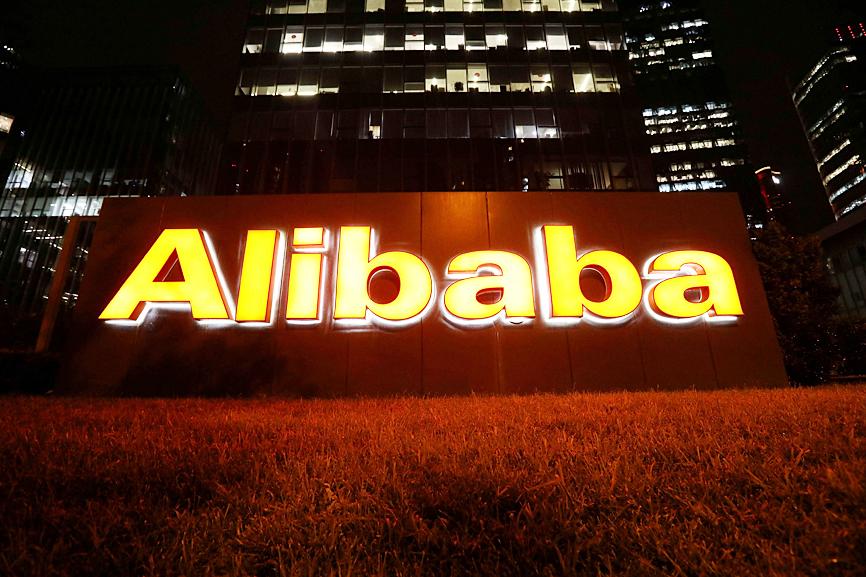A consortium led by Alibaba Group Holding Ltd (阿里巴巴) has emerged as the frontrunner to take over Tsinghua Unigroup Co (清華紫光), a deal that could fetch more than 50 billion yuan (US$7.8 billion) to help keep China’s indebted chip champion afloat.
The Chinese government is leaning toward the Alibaba-led offer given the e-commerce giant’s financial heft and the potential synergies with its own cloud and semiconductor business, people familiar with the matter said.
The consortium, which includes funds backed by the Zhejiang Provincial Government, is edging out several competitors for Beijing-based Unigroup, several other people said, asking not to be identified as the information is private.

Photo: Reuters
A successful deal could help avert one of China’s biggest potential corporate failures, while securing for Alibaba valuable chip know-how and a supply of semiconductors to fuel the country’s largest cloud computing platform.
While the transaction is expected to be completed as soon as next month, negotiations are ongoing and details on timeline, deal size and a final buyer could still change, they said.
Billionaire Jack Ma’s (馬雲) empire is mostly known for its e-commerce leadership, but the Hangzhou-based firm that he cofounded has in the past few years made enormous headway into computing and last month unveiled one of the country’s most advanced chips.
A deal could help Alibaba score points with Beijing, which punished the e-commerce giant for monopolistic behavior, but also wants to reduce its reliance on the US for chips.
Any deal is likely to include conditions for restructuring more than 100 billion yuan of onshore and offshore debt that Unigroup has, another person familiar with the discussions said.
Alibaba representatives had no immediate comment, while a Unigroup spokesperson did not immediately respond to requests for comment.
Aside from the Alibaba-led consortium, several state-backed companies, including semiconductor investment fund JAC Capital (建廣資產管理), Wuxi Industry Development Group Co (無錫產業發展集團) and Beijing Electronics Holding Co (北京電子控股) also weighed bids, the people said.
The Beijing-based company, which is affiliated with China’s Tsinghua University, remains a linchpin in a race for technological supremacy with the US.
The Chinese semiconductor titan last year defaulted on a bond and in July a court ordered it to overhaul its debt, prompting it to invite strategic investors with deep pockets as well as the capability to run a major chip-making and cloud business.
Confidence that Unigroup’s distressed assets would not get left in limbo grew after a debt-workout plan in May for its peer, Peking University Founder Group Corp (北大方正集團).
Under the plan, Founder, which is linked to another of China’s academic institutions, is to receive billions of dollars from strategic investors, including a state-owned property developer.

France cannot afford to ignore the third credit-rating reduction in less than a year, French Minister of Finance Roland Lescure said. “Three agencies have downgraded us and we can’t ignore this cloud,” he told Franceinfo on Saturday, speaking just hours after S&P lowered his country’s credit rating to “A+” from “AA-” in an unscheduled move. “Fundamentally, it’s an additional cloud to a weather forecast that was already pretty gray. It’s a call for lucidity and responsibility,” he said, adding that this is “a call to be serious.” The credit assessor’s move means France has lost its double-A rating at two of the

AI BOOST: Although Taiwan’s reliance on Chinese rare earth elements is limited, it could face indirect impacts from supply issues and price volatility, an economist said DBS Bank Ltd (星展銀行) has sharply raised its forecast for Taiwan’s economic growth this year to 5.6 percent, citing stronger-than-expected exports and investment linked to artificial intelligence (AI), as it said that the current momentum could peak soon. The acceleration of the global AI race has fueled a surge in Taiwan’s AI-related capital spending and exports of information and communications technology (ICT) products, which have been key drivers of growth this year. “We have revised our GDP forecast for Taiwan upward to 5.6 percent from 4 percent, an upgrade that mainly reflects stronger-than-expected AI-related exports and investment in the third

Mercuries Life Insurance Co (三商美邦人壽) shares surged to a seven-month high this week after local media reported that E.Sun Financial Holding Co (玉山金控) had outbid CTBC Financial Holding Co (中信金控) in the financially strained insurer’s ongoing sale process. Shares of the mid-sized life insurer climbed 5.8 percent this week to NT$6.72, extending a nearly 18 percent rally over the past month, as investors bet on the likelihood of an impending takeover. The final round of bidding closed on Thursday, marking a critical step in the 32-year-old insurer’s search for a buyer after years of struggling to meet capital adequacy requirements. Local media reports

RARE EARTHS: The call between the US Treasury Secretary and his Chinese counterpart came as Washington sought to rally G7 partners in response to China’s export controls China and the US on Saturday agreed to conduct another round of trade negotiations in the coming week, as the world’s two biggest economies seek to avoid another damaging tit-for-tat tariff battle. Beijing last week announced sweeping controls on the critical rare earths industry, prompting US President Donald Trump to threaten 100 percent tariffs on imports from China in retaliation. Trump had also threatened to cancel his expected meeting with Chinese President Xi Jinping (習近平) in South Korea later this month on the sidelines of the APEC summit. In the latest indication of efforts to resolve their dispute, Chinese state media reported that